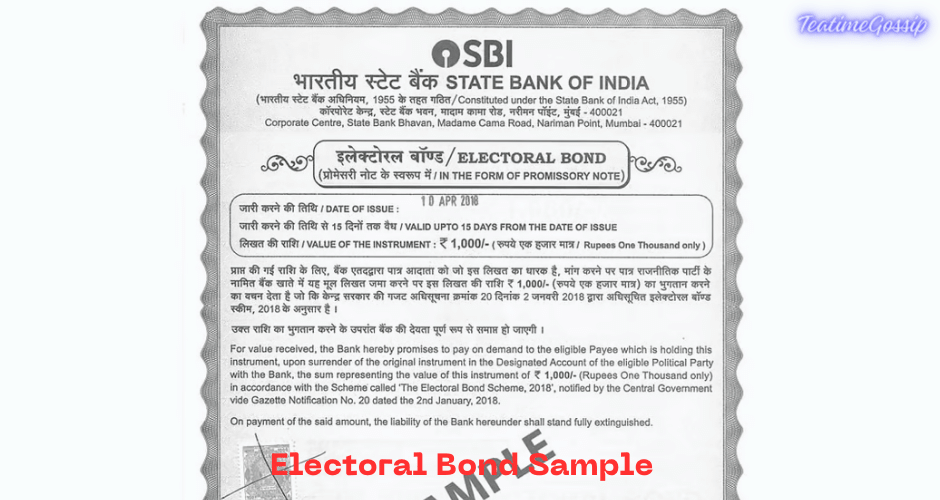Electoral Bond: A Controversial Mechanism in India’s Political Financing

In recent years, the issue of political funding has been a subject of considerable debate and scrutiny in India. Against this backdrop, the introduction of Electoral Bonds by the Government of India in 2018 aimed to reform the system of political donations and enhance transparency in political financing. However, the Electoral Bond scheme has been a topic of contention, with critics raising concerns about its potential implications for accountability, integrity, and democratic governance. Let’s delve into the intricacies of Electoral Bonds and explore the various perspectives surrounding this controversial mechanism.
Understanding Electoral Bonds
Electoral Bonds are financial instruments introduced by the Government of India as a means of facilitating transparent and accountable political funding. These bearer instruments allow individuals, corporates, and other entities to make donations to political parties anonymously, thereby protecting the identity of the donor. Electoral Bonds are issued in denominations ranging from ₹1,000 to ₹1 crore and can be purchased from specified branches of authorized banks. Political parties can encash these bonds within a specified period and utilize the funds for election-related expenses, such as campaign expenditures and organizational activities.
The Rationale Behind Electoral Bonds
Proponents of Electoral Bonds argue that the scheme serves several important objectives in the realm of political financing. Firstly, it is viewed as a mechanism to enhance transparency by channelling political donations through formal banking channels, thereby reducing the scope for illicit or unaccounted money in the electoral process. Additionally, Electoral Bonds are seen as a means of promoting clean and legitimate funding, as donors are required to comply with Know Your Customer (KYC) norms and disclose their identities to the issuing bank. Moreover, the anonymity afforded by Electoral Bonds is considered essential to protect donors from potential reprisals or harassment in a politically charged environment.

Criticisms and Concerns
Despite the purported benefits of Electoral Bonds, the scheme has faced significant criticism from various quarters. Critics argue that the anonymity granted to donors undermines transparency and accountability in political funding, as it shields parties from disclosing the true sources of their funding. Moreover, there are concerns about the potential for misuse of Electoral Bonds by vested interests to influence political parties and shape policy outcomes without public scrutiny. Additionally, the lack of disclosure requirements regarding the utilization of funds raised through Electoral Bonds has raised questions about the accountability of political parties and their adherence to ethical standards.
Legal and Regulatory Challenges
The legality and constitutionality of Electoral Bonds have also been subject to legal challenges. Critics contend that the scheme violates principles of transparency and fairness enshrined in the Constitution of India, as it allows for anonymous and unrestricted political donations. Several public interest litigations (PILs) have been filed in the Supreme Court of India challenging the validity of Electoral Bonds, calling for greater transparency and accountability in political financing. However, the Supreme Court’s rulings on the matter have been mixed, with some aspects of the scheme upheld while others remain under judicial review.
The Way Forward
The debate surrounding Electoral Bonds underscores the complex and multifaceted nature of political funding in India’s democratic framework. While the scheme represents an attempt to reform and streamline the process of political financing, its implementation has raised significant concerns about transparency, accountability, and the integrity of the electoral process. Moving forward, there is a need for a comprehensive and inclusive dialogue involving all stakeholders, including political parties, civil society organizations, and the judiciary, to address the shortcomings of the current system and explore alternative mechanisms for ensuring clean, transparent, and accountable political funding in India.
In conclusion, Electoral Bonds represent a contentious yet significant initiative aimed at reforming political financing in India. While proponents argue that the scheme enhances transparency and legitimacy in political funding, critics raise valid concerns about its potential implications for accountability and democratic governance. As the debate continues to evolve, it is imperative for policymakers and stakeholders to engage in constructive dialogue and deliberation to find a balanced and sustainable solution that upholds the principles of transparency, integrity, and democratic values in India’s electoral process.